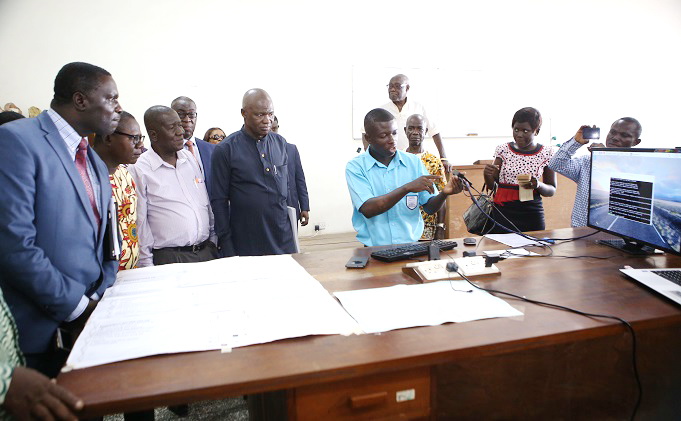The St Thomas Aquinas Senior High School (SHS) last Monday emerged winner of this year’s edition of the National Science and Technology Fair Awards by developing a computer central processing unit that can be used for educational purposes.
Known as the HexEduBox, it was developed by a team of six students led by Emmanuel Osei Ababio who used mobile phone microprocessors for their device which can function as a central processing unit CPU.
In the junior high schools (JHS) category, Wilfred Owusu of the Kpeve Junior High School in the Volta Region also won the ultimate prize for designing water-powered hydraulic excavator and tipper.
The two winners received a laptop and a certificate of participation as prizes. The second to fifth prize winners received textbooks and certificate as prizes.
The two projects were among 40 others received from 20 senior high schools and 20 junior high schools.
Master Ababio appealed to the government to replicate the Hexedubox for use in rural communities where access to technology was difficult.
Other winners
Other winners in the SHS category were Roger Wienaah of the Francis Xavier SHS in the Upper West Region whose innovative simple hand-held vacuum pump won him the second prize.
While the third place went to Samuel Danquah of the Tamale Senior High School in the Northern Region, for a wireless power transfer, the fourth and fifth positions went to Divine Nyame and Nana Edua Quantua Cudjoe of the Ghana National College in the Central Region and Archbishop Porter Girls in the Western Region, respectively.
They designed a photo security unit that tracks movement or shadows around a house and a solar oven respectively.
In the JHS category, Moses Ayembata Ayembila of the Manheah Anglican 1 Basic School came second for building a solar inverter and Adams Nii Tetteh of the Manheah Anglican 2 Basic School, both in the Greater Accra Region was third for his anchovies dryer.
The fourth prize went to Eileen Doe of Kabore JHS in the Volta Region who designed targets compressed saw dust and briquette as an alternative fuel source in Ghana, with Gyandu Asiedu Kwaku Obiri of the Trinity Presby Model School, receiving the fifth prize for his automated security light and fence project.
Other projects developed by the participants include, hair relaxer made from cassava, automatic house light system, poultry egg incubator/hatcher and insecticides.
Sponsored by Douglas Arthur Limited and ITEC, the project is aimed at unearthing innovative and talented students whose projects can offer solutions to the country’s science and technology challenges.
Government’s vision
In a speech read on his behalf, the Minister of Education, Dr Mathew Opoku Prempeh, declared that to attain the government’s vision, it was necessary that children in “every part of the country have access to mathematics/science lessons delivered by first class teachers.”
“We will turn Ghana into a Mathematics and scientific-friendly country. And we will aggressively promote science, mathematics, technology and engineering (STME) education across all levels of the education system,” he said.
Encouraging the participants, the minister, who was represented by the Chairman of the Parliament Select Committee on Education, Dr Yaw Osei Adu-Twum, said, “nation is prepared to support you to develop scientifically and technologically as a major human resource. You are the most crucial resource of our nation’s meaningful socio-economic development. ”
Self-reliant nation
The Director-General of the Ghana Education Service, Mr Jacob Kor, who chaired the award ceremony, observed that science and technology was key to helping transform the country to become self-reliant.
He said the service would connect some of the students to research and industry to make their projects more viable instead of gathering dust of shelves.
The Director of the Science Education Unit, Mr Andrew Quaye, made a passionate appeal to the government to support the unit with the required resources to train teachers and ultimately unearth science and technology talents for the nation.

